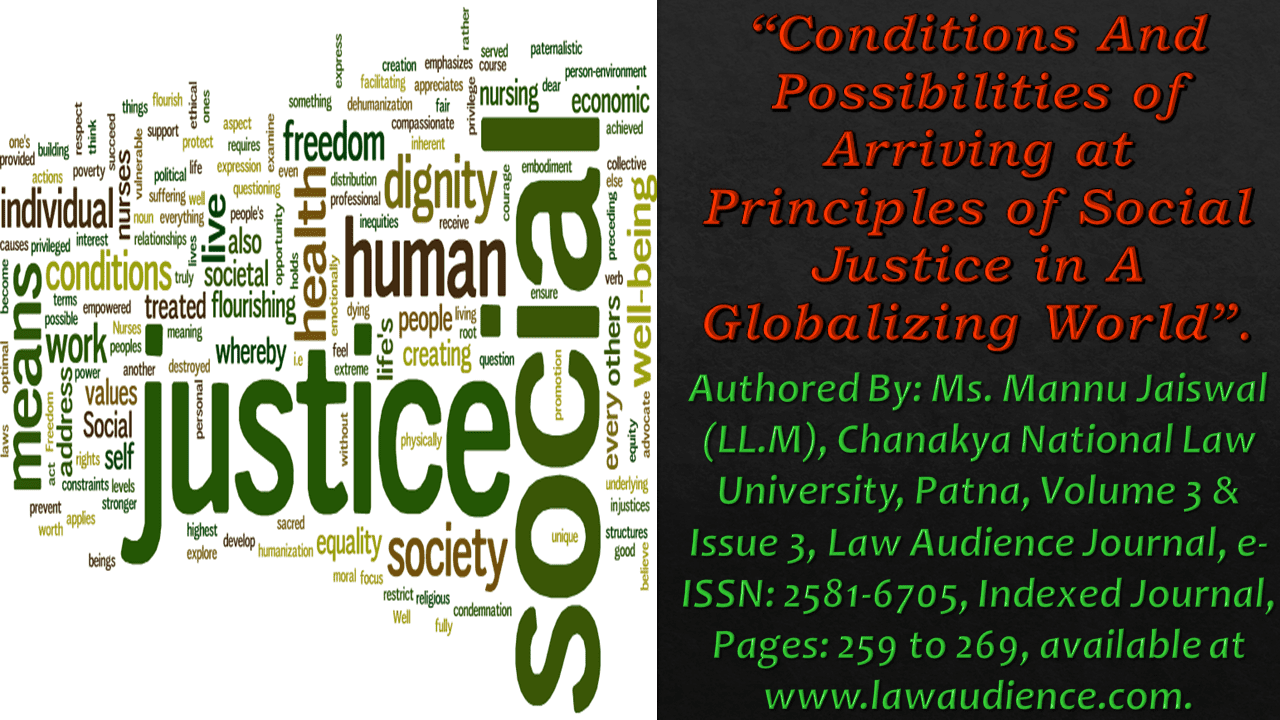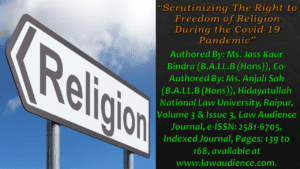Click here to download the full paper (PDF)
Authored By: Ms. Mannu Jaiswal (LL.M), Chanakya National Law University, Patna,
Click here for Copyright Policy.
I. INTRODUCTION:
The main concern of this paper is to critically explore the possibility of arriving at principles for international justice – through investigating the link between self and other conceptions in international relations, for justice among states. My focus on claims of social justice in the international realm does not in any way suggest that other claims of justice, such as those of the justness of war, the boundaries of states, and/or the concern for refugees, to mention a few, are of lesser importance.
In fact, the world we live in is witnessing an increased instance of such injustices, which need to be understood conceptually and addressed politically. However, the main concern of this study is only to critically examine and attempt to discern the conditions and possibility of arriving at principles of social justice which can be applied at the international realm. In doing so, the study explores the relationship between the self and the other, which constitutes the basis of the idea of justice.
Ideas aren’t born in a vacuum; they’re generally the result of the setting in which they’re born. As a result, the conceptual tools we use to explain social reality must stay responsive to fundamental changes in the context in which they are used, lest they lose touch with reality to the point when, rather than supporting us in comprehending our world, they become obsolete spectacles that make comprehension impossible. The argument being made is that the velocity of change that characterises our world today has conceptual repercussions, ramifications that must be considered if we expect our conceptual schemas to give an appropriate comprehension of the objects of our research.
A series of phenomena that may be succinctly defined as globalisation is one of these basic continuing transformations that requires some considerable reworking of our conceptual schema. In recent scholarship, globalization has come to occupy a central place, thus within disciplines as disparate as Architecture, Sociology and Philosophy, there are conscious attempts to incorporate the global a unique viewpoint on the debates and analyses that take place in these fields Globalization has many different dimensions, including political, economic, and cultural.
The objective here is to examine the nature of the relationship between the self and the other in dominant understandings of international justice and subsequently begin to suggest an understanding of this relationship which could constitute the basis for justice among states
- to suggest that the relationship between the self and the other is not only a central aspect of justice, rather it determines the nature of justice as well as the correction or remedy it entails
- to examine the nature of the relationship between the self and the other in dominant understandings of international justice and subsequently begin to suggest an understanding of this relationship which could constitute the basis for justice among states.
II. THE TRADITIONAL CONCEPTION OF JUSTICE:
From the time of Plato and Aristotle until very recently, political philosophy’s knowledge and definition of justice has been inextricably linked to territorially defined communities. Plato and Aristotle, for example, were particularly interested in elucidating the essence of justice in their time’s small-scale civilizations. They cannot be criticised for restricting the concept of justice to connections between Greek city states; given the time period in which they lived, these intellectual titans could not have imagined the large-scale communities that exist today, let alone the huge interactions between them.
However, it is instructive that during the Hellenistic period, the Stoics established the concept of justice, which saw the former as a norm that should apply to all people, regardless of ethnic or political membership. All men are united by logic, according to the stoics, and hence have a sufficient basis to subscribe to a set of common justice principles. When Cicero says, “The first shared possession of human people and God is reason,” he is eloquent.
Those who have a common sense of reason, however, must also share a common sense of correct reason. And, since correct reason is law, we must think that mankind and Gods share the same law. And, since correct reason is law, we must think that mankind and Gods share the same law. Those who share law must also share justice; those who do should be considered members of the same commonwealth (Stumf and Fieser, 2003:114).
III. THE CENTRALITY OF JUSTICE AND THE SELF/OTHER RELATIONSHIP:
Justice has been maintained and viewed as the basic, if not defining value for all social and political institutions for a long time, in fact since the beginning of political theorising. Justice has been highlighted as the most determining and decisive among the various values and principles that have come to be seen as essential for a legal social political setup. It has long been seen as the foundation for determining the goodness or correctness of a social political structure, as well as the yardstick by which practically all other issues are measured. Justice is not just a value in and of itself; it is also the value that underpins all other values, serving as the determinant of all political goals and considerations. Since antiquity, the pursuit of justice has been a central theme in political theory. Justice has been regarded as the fulcrum of all social and political life since Plato’s dialogues, and possibly even earlier.
Plato’s Republic’s core theme remains the development, legitimization, and formation of a just political system; it is for this reason that Socrates argued that “to live well, honourably, and justly, are the same thing.” The state, as it was understood in the past, was conceived as an institution dedicated largely to determining and ensuring the ideal of justice. In fact, this understanding of the state can be found in almost all strands of political thought, from Plato’s arguments to Locke’s theory of property protection, to the guarantee of nyaya and/or the establishment of dandaniti and dharma in classical Hindu philosophy or even the idea of dhamma in Buddhist philosophy to mention just a few.
However, the state’s concern for justice was eventually eclipsed or surpassed by the need for order. Many would argue, however, that this eclipse was not unintentional or unplanned. According to Philip Bobbitt, the state was designed and constructed as a “war-making institution” with power as its primary preoccupation in order to allow the formation and justification of a state focused toward the establishment and maintenance of order among its members. Surprisingly, the subject/citizen was seen as someone who, in the lack of sovereign authority’s controlling and regulative capabilities, simply failed to live in a well-managed society. Surprisingly, much of current political theory carves out a social life knowledge to justify the desirability and possibility of an order-regulatory state. Thomas Hobbes, an influential thinker in this regard and one of those credited with opening the modern and thus rationally consensual concept of the state, works out his understanding of man who is engaged in a never-ending struggle for power and whose life in such a situation is “solitary, poor, nasty, brutish, and short.” Men are robbed of the power and rationality to construct and preserve a well-ordered life in this warlike condition of nature, and are thus forced toward the rational contractual formation of the state, which aids the guarantee of a well-ordered life.
IV. COMMUNITARIANISM AND THE IDEA OF INTERNATIONAL JUSTICE:
In general, a theory of global justice aims to give us an account of what justice on a global scale consists in and this often includes discussion of the following components:
- identifying what should count as important problems of global justice
- positing solutions to each identified problem
- identifying who might have responsibilities in addressing the identified problem
- arguing for positions about what particular agents (or collections of agents) ought to do in connection with solving each problem and
- Providing a normative view which grounds (1)–(4).
Theories of global justice aim to help us understand our world better and what our responsibilities are in it. While some theorists aim purely at theoretical understanding, others hope also to provide an analysis that can be useful in practical policy making concerning global justice matters.
V. COSMOPOLITANISM, DUTIES TO NON-COMPATRIOTS, AND COMPATRIOTS:
Are compatriots unique in terms of what we owe one another? Do we owe non-compatriots the same responsibilities as we do compatriots, or should these two sets of responsibilities be distinguished in some way? Nationalists say that we are members of national communities, and that any discussion of our global obligations that overlooks this omits a key component of how we interact to one another. They say that nations may give a strong foundation for social attachment, identity, and purpose in life, as well as particular responsibility to strengthen national life and support co-nationals. Others defend nationalism’s usefulness on pragmatic grounds: our inter-national connections aren’t fundamentally special, but state borders are useful in assigning important duties to particular agents (Goodin 1998). Paying special attention to one’s co-nationals can be appropriate in a world where there is a significant deal of unmet need (Goodin 1998).[1]
Cosmopolitans perceive themselves as “citizens of the globe,” in the words of Diogenes, often credited as the first person to propound cosmopolitan beliefs. Contemporary cosmopolitans often believe that every human person has ultimate moral concern and is entitled to equal treatment of her interests regardless of other affiliations, particularly national affiliations. Cosmopolitans attempt to extend our moral scopes, based on the premise that we all have equal moral worth, so that we do not forget our responsibilities to those outside state lines, even while we also have local responsibilities. There are two modern accounts of cosmopolitanism that stand out. As human beings, Martha Nussbaum underlines that we are part of a global community of human beings (Nussbaum 1996). While love for one’s country has a genuine role in people’s ideals of a meaningful life, Nussbaum believes that we should not disregard the numerous other relationships that connect us to others around the world. We must bring the global community closer to the local community, and, more broadly, strive to perceive ourselves as members of overlapping communities with significant claims on us. Thomas Pogge provides a hugely influential analysis that focuses on the global institutional implications of cosmopolitanism.
We must ensure that global institutional systems take everyone’s interests into account equally. This obligation of equal consideration of interests only applies in these circumstances. While such impartiality requirements are well-known within the state, such as when judges work in law courts, we have yet to recognize the requirement on a global scale. It is sometimes considered that cosmopolitanism must be at odds with more local commitments to friends, family, or fellow citizens. Some cosmopolitans feel that while conflict is unavoidable and crucial in comprehending what cosmopolitanism involves, the conclusion is unproblematic (Ypi 2013). Others argue for various approaches to resolving the perceived difficulties (Pogge 2013, Tan 2004). Pogge underlines the distinct division of realms in which equal consideration of people’s interests applies, as seen above.
A similar argument is made by Kok-Chor Tan. His goal is to demonstrate that global institutional systems should be governed by cosmopolitan ideas, ensuring that everyone are treated equally in their entitlements (Tan 2004). When this is the case, patriotism can have a genuine role to play within these boundaries. Co-national solidarity does not have to conflict with cosmopolitan commitments. A concern for social justice is very important to me. Another notable technique is to suggest that we cannot accomplish national justice unless we address global justice. Even if we feel profoundly about social justice in our own country, we have at least instrumental reasons to care about global justice, according to this viewpoint (Banai, Ronzoni and Schemmel 2011, Ronzoni 2013). There is a heated discussion among egalitarian thinkers over whether our concern for equality should be limited to citizens of the same state or should be broadened to include everyone on the planet. Some theorists suggest that rigorous evaluation of concepts like reciprocity, coercion, and fair terms of cooperation requires us to prioritise the interests of our fellow citizens. Others, on the other hand, maintain that, when properly understood, these issues point to equally substantial obligations to non-compatriots. One version of the argument that we have unique duties to our fellow citizens that we do not have to non-citizens depends on the coercive legal structure that exists within governments and contends that it does not exist outside of them (R. Miller 1998, Blake 2001). Another widely accepted viewpoint asserts that the authority to enforce justice within and outside the state differs (Nagel 2005).
Such roles come with a slew of significant hurdles. One key line of argument claims that coercion is relevant in triggering egalitarian justice responsibilities, but that because it is widespread at the global level, it activates global rather than just national egalitarian duties (Cohen and Sabel 2006, Abizadeh 2007). Furthermore, others contend that the same factors identified by Nagel as critical in producing national authority also exist at the global level (Cohen and Sabel 2006). For further information on these topics, see the section on international distributive justice. See the entries on nationalism and cosmopolitanism for in-depth coverage of these topics.
VI. THE PROPER USE OF FORCE, MILITARY INTERVENTION, AND ITS AFTERMATH:
VI.I WAR AND JUST CONDUCT:
War-related concerns have one of the most illustrious histories in the subject of global justice. Much of the discussion over the right use of force in international affairs has been framed by the just war paradigm. Some of the earliest accounts of the criteria that must be met for war to be justified may be found in Aristotle, Cicero, Augustine, and Thomas Aquinas. The criteria under which entry into the war is justified (Jus Ad Bellum) and the conditions for fair conduct inside the war have both been widely researched (Jus In Bello). While it is widely assumed that having a fair reason is a required prerequisite for a war to be justified, it is not sufficient. The most common additional conditions proposed are that the war be carried out by a proper authority, with the right intentions, when the war is carried out in accordance with proportionality requirements (the goals to be achieved justify going to war), only as a last resort, and when there are reasonable chances of success. All requirements must be met, according to classic versions of just war theory, but many recent theorists question whether they are all necessary (Mellow 2006, Moellendorf 2002).
Once the fighting starts, two basic rules guide the assessment of whether the war is being waged fairly: one that respects the distinction between combatants and noncombatants (The Principle of Noncombatant Immunity), and another that limits what constitutes proportional use of force (Proportionality). On the one hand, it is illegal to employ force against civilians, and it is also illegal to purposefully target non-combatants, even if some collateral civilian damage may occur. Second, combatants may only employ the force necessary to achieve their goals; the force must be proportional to the goals that must be achieved in order to conduct the war. There are other prerequisites for fairness, such as following international rules and treating prisoners equitably, but the two main principles are the most frequently stated in normative Jus In Bello analysis.
The third component of just war theory (Jus Post Bellum) is concerned with how the war ends and how to return to a peaceful state. It addresses themes including restitution, punishment, and reform. More recently, justice in quitting the war (Jus Ex Bello), which concerns when it is right to terminate a conflict, has been suggested, particularly in light of engagements in Iraq and Afghanistan from 2001 to 2011, especially in light of engagements in Iraq and Afghanistan from 2001 to 2011. (Moellendorf 2008, Rodin 2008).
There are a slew of current global justice issues involving the proper use of force and its consequences that demand consideration, including: Is it legal to use drones in warfare? Is it ever possible to justify terrorism? Is it justifiable to carry out “targeted assassinations” (in which those who are principally responsible for war choices are targeted for assassination)? Is it permissible to go to war in order to avoid a “worse war” (as proponents of the “Bush Doctrine” claim)? Is it OK to use torture to contain huge global threats? Is the endeavour by those who currently have nuclear weapons to control their growth already rife with hypocrisy? What is the best way to deal with cultures that are in the midst of a transitional justice process? When are political apologies for historical wrongdoing acceptable?
Only two other topics of contemporary interest in the global justice literature are briefly discussed here: humanitarian intervention and terrorism. For a more in-depth look at these issues, see the section on terrorism. For a thorough review of topics involving war justice, see the section on war.
VI.II HUMANITARIAN INTERVENTION:
What conditions, if any, would allow us to intervene militarily to prevent genocide? As large-scale human rights breaches and suffering occurred in Rwanda, Sudan, the former Yugoslavia, and Libya in recent years, this subject has gained prominence. Successful arguments were marshalled that there are crucial responsibilities to protect the weak, despite the traditional view that honouring state sovereignty implies non-interference (International Commission on Intervention and State Sovereignty 2001).
The International Commission on Intervention and State Sovereignty stated that we may participate in war to protect those who suffer at the hands of governments unwilling or unable to cease large-scale human rights abuses, relying mainly on the conventional prerequisites contained in the just war framework. The commission’s landmark report “The Responsibility to Protect,” which was endorsed by the United Nations in 2005, has impacted choices in recent cases such as Libya in 2011 and Syria in 2012. The question of whether humanitarian interventions are just another type of imperialism is frequently raised. What mechanism will be used to hold intervenors accountable for their actions? Allen Buchanan and Robert Keohane, taking such concerns seriously, suggest for a variety of novel accountability systems, both before and after the proposed intervention, to calm fears of abuse (Buchanan and Keohane 2004).
VI.III TERRORISM:
What types of violence are considered terrorism? Is there a distinction between state-sponsored terrorism and that perpetrated by insurgent groups? Is it possible that terrorism could be justifiable in some circumstances? Terrorism is defined as the use or threat of violence against people who are presumed to be innocent in order to achieve outcomes that would not otherwise occur (Coady and O’Keefe 2002, Primoratz 2013). Some argue that the targeted are not guilty.
As terrorists frequently point out, citizens pay taxes and vote, and their governments engage in behaviours that they might be said to approve and from which they gain, thus holding civilians accountable for their governments’ conduct makes sense. Citizens can be valid targets of violence, according to this viewpoint. Furthermore, governments have targeted civilians in the past when they deem a situation to be a “supreme emergency,” as happened in the case of Britain targeting German citizens during World War II. As a result, when governments determine that a moral disaster is sufficiently likely, it can be averted using unconventional and otherwise abhorrent tactics.
VII. CONCLUSION:
In the age of globalization, characterized as it is by the increasing deterritorialization of social relations and the possibility of transnational harm, the traditional bias of academic political philosophy towards domestic justice is no more tenable. Granted that the globalizing forces and processes have been at work from the dawn of history, the present speed and scope of the spread of transnational relations demands that we must now incorporate a global dimension to our understanding of justice. To continue to insist on the national attachments as precondition for the consideration of justice as the communitarians are want to do, is not to come to terms with the reality of global processes which are not only fragmenting attachments within territorial spaces but are also giving rise to new attachments and relations which transcend the territorial spaces of Westphalian cartography.
Globalization is changing the nature of social relations from one that is predominantly territorial to one that is significantly supraterritorial. It is imperative therefore that the concept of justice be extended to cover interactions which are taking place in transnational spaces or else we leave the global masses at the mercy of the global economic elite- there can be no just global order until justice goes global.
Cite this article as:
Ms. Mannu Jaiswal, “Conditions And Possibilities of Arriving at Principles of Social Justice in A Globalizing World”, Vol.3 & Issue 3, Law Audience Journal (e-ISSN: 2581-6705), Pages 259 to 269 (3rd February 2022), available at https://www.lawaudience.com/conditions-and-possibilities-of-arriving-at-principles-of-social-justice-in-a-globalizing-world.
Footnotes & References:
[1] Self-determination, according to nationalists, is essential for ensuring what matters to citizens. The right to self-determination ensures that national values and life can be expressed and promoted. These claims raise a number of intriguing concerns, including when a group is entitled to self-determination. When does the right to self-determination imply a claim to land? When would a strong claim to secession arise from the right to self-determination? When should the right to self-determination give way to other issues of global justice, such as human rights protection? For more information on these topics, see the entries Secession and Nationalism.



